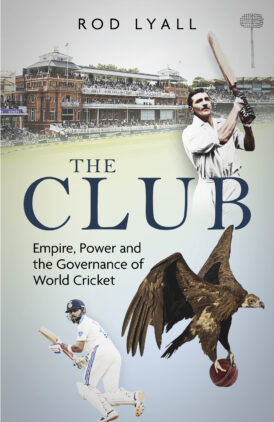The Club
Martin Chandler |Published: 2025
Pages: 320
Author: Lyall, Rod
Publisher: Pitch
Rating: 3.5 stars

Over recent years I have spent plenty of time complaining about the way in which the ICC runs cricket, something which I continue to do. A fair question, which I’ve never actually been asked during the course of one of my tirades, is as to how much I actually know about the organisation I am moaning about. The answer it would seem, having reading this illuminating history of the ICC, would have been much less than I thought I did.
Perhaps the best example of that is that whilst I did know that England, Australia and South Africa had formed the original Imperial Cricket Conference back in 1909, I had not actually realised that back then, and for many years afterwards, it was quite literally a conference and little more than a talking shop, the real power always being with the Boards of the individual countries.
Despite the lack of real power that the original ICC had its history is interesting nonetheless, and not quite the closed shop I always thought ‘The Club’ to be. One of the things I did not know is that when the membership was extended in the decade after the Great War to include India, New Zealand and West Indies there was some consideration also given to including Argentina and the USA as well.
Its lack of absolute authority meant that the ICC struggled with anything that related to the laws of the game, which it couldn’t legislate over, and therefore it was sorely taxed by the ‘Bodyline’ crisis and other troubled waters that the game has had to navigate. The issues relating to South Africa and apartheid were, of course, the most difficult of all.
In time things changed. The Imperial Cricket Conference became the International Cricket Conference in 1965, which didn’t alter very much, and then it became the International Cricket Council in 1989, and since then the modern ICC has gradually built up its strength and nowadays it is the dog that wags the tail rather than, as in years gone by, the other way round.
But does the dog always behave as it should? Which question brings me back to where I started and the feeling that for all its undoubted good intentions, and indeed achievements, the ICC doesn’t succeed in being the sort of body I would like to see in charge of cricket.
Which leads on to what was, for me, the most interesting part of the book, and a part of cricket history that I had quite forgotten, although I now understand why that happened.
I shall begin with a digression on the subject of Lord Woolf, a highly respected member of the judiciary in England. Back in 1998 Lord Woolf was the architect of a complete overhaul of the civil justice system in England. He created a unified set of rules for civil justice and gave the system an overriding objective it had never previously had. It begins these Rules are a new procedural code with the overriding objective of enabling the court to deal with cases justly and at proportionate cost.
Stating the obvious, surely? In fact it was most certainly necessary. You can never stop lawyers using the rules as some sort of sport, but the the old system had in many ways lost sight of what their ultimate purpose was, and the overriding objective was a timely reminder to all of us that the object of the exercise was to achieve justice bewteen the parties to a case, and do so fairly.
A generation on the Civil Procedure Rules have, given all the crosses our justice system has to bear, significantly improved matters so the appointment of Lord Woolf by the ICC to examine the organisation’s governance in 2011 was clearly a sensible decision. Unsurprisingly when Woolf reported at the beginning of 2012 he was critical of what he had found, and recommended sweeping changes.
Did the ICC take it on the chin and carry out the reforms that had been recommended? Not a bit of it, they adopted nothing and Woolf’s report gathers dust to this day, despite its proposals seeming all the more attractive as time passes with no movement towards the implementation of its goals whether now or in the future.
And on the subject of the future what does that hold? It would be fair to say that Rod Lyall is not, in common with many of us, optimistic, but we shouldn’t give up hope. The game is far too important for that and maybe things will improve, although if they do on the current trajectory I suspect that will be more through luck than judgment.
So Rod Lyall’s first book has a great deal to commend it. It may not cover too much in the way of new ground, but it does tell a story that has only been told on a piecemeal basis in the past, and he is clearly a man who knows his subject inside out and he has articulated it very well. This one is recommended reading, not least for the current incumbents of those lavish offices in the UAE.






Leave a comment